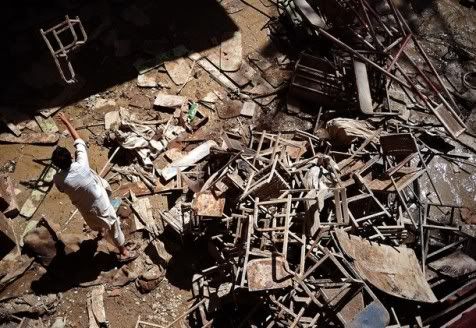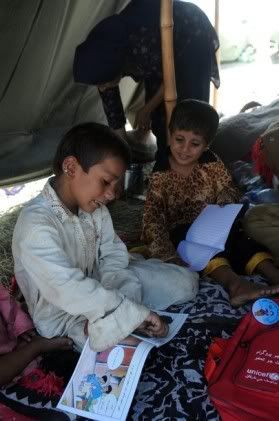
In order to really understand the magnitude of what has happened, we need to look at the numbers and what they really signify. This became much more real to me when I read the recent news in Dawn about a press conference where Umar Amal, a UNESCO official describes exactly what this flood will mean to the children of the flood:
- Five to six percent of all the schools in Pakistan – 9,780 government schools in total – have been either partially or fully damaged by the flooding.
- This translates into between 1.5 to 2.5 million students, with the UN Children’s Fund saying that over ten million children – including 2.8 million under the age of five – have been affected.
- The officials also believe that once the tally of private schools that have been damaged is added in, the number will surge above the 10,000 mark.
- In addition to these damaged schools – 2,700 of which are fully damaged – another 5,563 schools are still being used as relief camps according to the UN’s Office for the Coordination of Humanitarian Affairs.
UNESCO points out the tremendous costs of the flooding on the education sector – reinforcing how hard our recovery will be and how crucial it will be for the heart and soul of Pakistan. The statistics are sobering, the reality heart-wrenching and the need more dire than ever before.
 These numbers really do speak for themselves, painting a picture of just one of the many long-term challenges we’ll face as we struggle to rebuild and move forward. As our country lies devastated by the horrific floods that ripped through it, trying to understand the sheer scale of the destruction and its impact on Pakistan for years to come constantly boggles the mind. The UN confirmed this earlier this week with their largest ever appeal for aid and calling this disaster the largest the organization has faced in its six decade history.
These numbers really do speak for themselves, painting a picture of just one of the many long-term challenges we’ll face as we struggle to rebuild and move forward. As our country lies devastated by the horrific floods that ripped through it, trying to understand the sheer scale of the destruction and its impact on Pakistan for years to come constantly boggles the mind. The UN confirmed this earlier this week with their largest ever appeal for aid and calling this disaster the largest the organization has faced in its six decade history.
The educational aspect however is especially serious given the historic problems with education in Pakistan, the costs needed to get these schools back in shape and the long-term effects this would have on the millions of children affected. While primary school enrollment and adult literacy both officially stood at 57%, many fear they are significantly lower and unfortunately it seems likely to further plunge as a result of this calamity.
It is time to use this announcement as a clarion call to refocus our efforts, to demand that we as a country refuse to accept this many children denied of an education, refuse to accept a new status quo that pushes so many further into poverty and illiteracy and pushes our country further away from our collective vision of where we want to be. However, cash-strapped and corruption-stricken, with so few funds and capabilities to tackle so large of a problem, the question arises – can we do it?
I think, we can. I think, we must.



















































I have been heartened by how many educational NGOs have been active in flood relief and are trying to address exactly this issue of schools and education.
@ Naan Haleem: Well said
Expecting from officials is foolishness.the question arises – can we do it?
Yes we can if we want.
جس دور میں لٹ جاتےفقیروں کی کمائی
اس دور کے سلطان سے کوئی بھول ہوئی ہے
Jinnah had an imagination. He crossed the finish line when no had something like that before. No one thought it could be done. And despite all odds, he defied all others who a prophesied the imminent and immediate collapse of Pakistan.
As the the first ever non-English governor general of a nation, Jinnah had less resources than Pakistan has today.
Jinnah had fewer educated Pakistanis to help him than Pakistan has today.
There was no industry, no State Bank of Pakistan, nothing, nothing, nothing. The structure exited in name alone.
But Jinnah had sincerity, will, discipline and an imagination of determination.
If there is one thing Pakistani need to learn from Jinnah, it is that there is a need for an imagination to solve the problem. And if there is one thing Pakistani need to understand from Iqbal, there is hope and sunshine but only with effort.
I can ask the question that needs to be asked, but do I need to?
What happens to these children and how they end up will be one of the defining impacts of these floods. How we deal with them and how we provide for them is important.